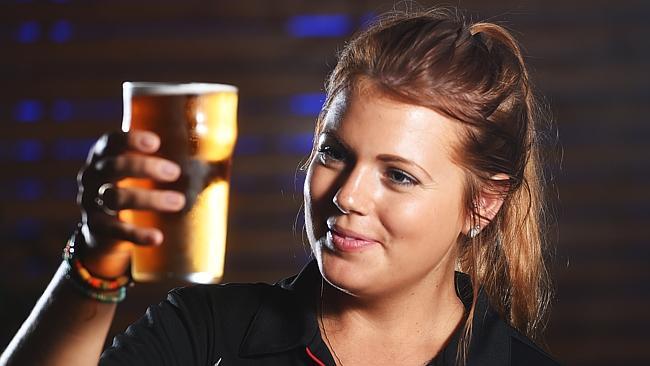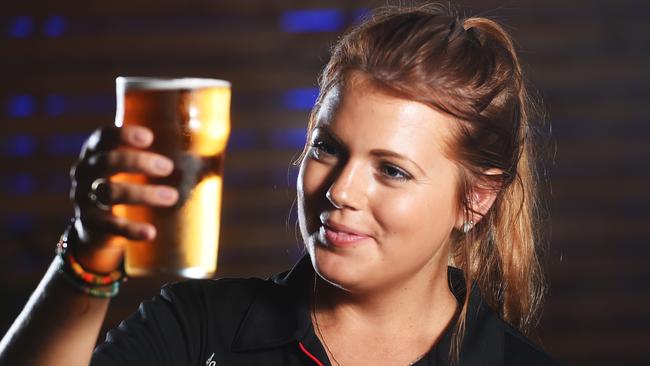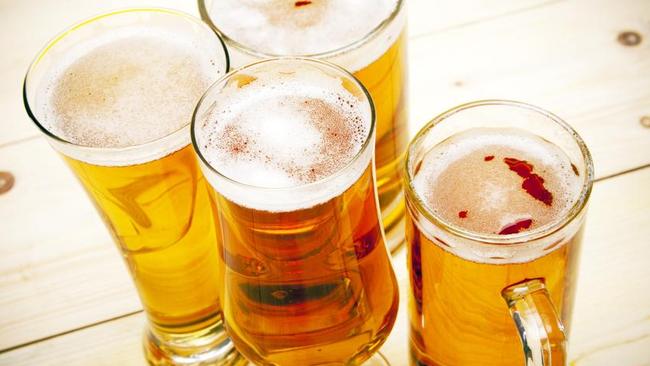Is beer a health food? No say nutritionists
MOST people feel great when they down a beer but the industry’s attempt to market the alcoholic drink as a super food has appalled nutrition experts.

Drinks
Don't miss out on the headlines from Drinks. Followed categories will be added to My News.
AN attempt to market beer as the new super food low in carbs and sugar has been struck down by nutrition experts who claim it’s still high in calories and alcohol.
“Despite what the brewers might imply, beer still hasn’t made its way into the food pyramid,” says Foundation of Alcohol Research and Education chief Michael Thorn.
“Health concerns about beer relate to its alcohol content, not its very modest carb content,” says Dr Rosemary Stanton who helped devise the national healthy eating guidelines.
“It’s the alcohol that contributes the kilojoules, at a rate of 29 kilojoules per gram. Beer contains very little in the way of valuable nutrients. There’s next to no protein, and no significant amount of other nutrients,” she says.

Lion. which makes XXXX, Tooheys, Hahn, James Boag, James Squire and Little Creatures beers, is using an internet site beerthebeautifultruth to market beer as a healthy choice.
The campaign spruiks nutritional labels on beer which show some varieties are low in sugar and carbs and it sells beer as a natural choice because it’s made only of hops, malt, yeast and water and is preservative free.
FARE will today mount a digital counterpunch via another new website called beertheobvioustruth which it says will help consumers see through the alcohol industry’s spin.
FARE says that alcohol companies should be prohibited from using language that can
mislead consumers into thinking that alcohol products have positive health qualities when they don’t.
Dr Stanton says alcohol negatively affects the body’s ability to metabolise kilojoules consumed from foods or from stored fat.

Far from being healthy, alcohol can cause more than 200 diseases and conditions including cancer, heart and liver disease. It is responsible for 5,500 alcohol-related deaths and a further 157,000 hospitalisations each year in this country alone, FARE says.
FARE says Lion’s campaign is designed to promote its newly introduced nutrition information panel (NIPs) across its range of beers.
The inclusion of a nutrition information panel alone does not magically make a product nutritious and should not be used as a marketing tool to mislead consumers, Mr Thorn says.
Lion denies the internet site is an attempt to claim beer is a health food.
“Beer drinkers have told us they want more information about what’s in their beers, particularly the sugar content, and we are responding to that demand. Calorie information is also provided — not only via a full nutrition information panel on the bottle, but on the outer packaging and on a dedicated website.,” the company said in a statement.
“Brewers have been reducing alcohol content for decades and continue to innovate with new low and mid strength beers, and now people will be able to see that lower alcohol also means lower calorie, which we believe should be welcomed,” the company said.

“If Australia’s brewers can roll out new product labelling across its entire product range when it sees an opportunity to give its beer a marketing edge, then consumers are justified in asking why Lion, Carlton & United Breweries and the entire industry continue to resist calls to introduce effective warning labels which would provide consumers with valuable health information that allows them to make a truly informed decision about the alcohol products they consume,” says FARE Director of Policy and Research Caterina Giorgi.
“It’s an attempt to market a drug as a healthy choice,” Ms Giorgi said.
Lion denied the website was an attempt to market beer as a health food.
“Beer drinkers have told us they want more information about what’s in their beers, particularly the sugar content, and we are responding to that demand. Calorie information is also provided — not only via a full nutrition information panel on the bottle, but on the outer packaging and on a dedicated website,” the company said in a statement.
“Brewers have been reducing alcohol content for decades and continue to innovate with new low and mid strength beers, and now people will be able to see that lower alcohol also means lower calorie, which we believe should be welcomed,” the company said.
Originally published as Is beer a health food? No say nutritionists



